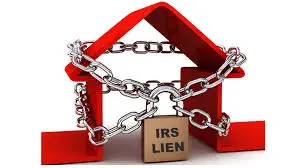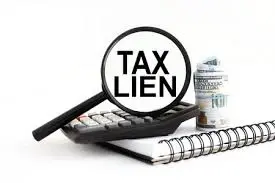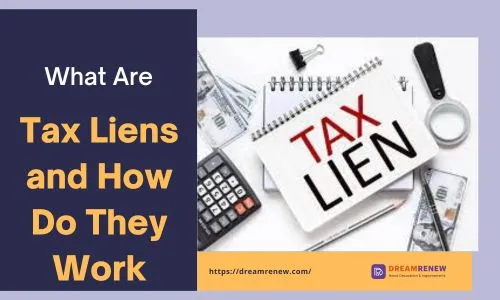A tax lien is a legal claim by a government on a person’s property or assets due to unpaid taxes, ensuring that the government eventually collects what’s owed. It often has priority over other creditors, can harm your credit, and is released once the tax debt is paid.
How do Tax Liens Work?
Tax liens work through a sequence of steps, involving government actions and legal procedures. Here’s a simplified overview of how tax liens typically work:
- Unpaid Taxes: When an individual fails to pay their taxes the government tax authority (usually local or federal) assesses the amount owed and sends a notice or demand for payment.
- Lien Filing: If the tax debt remains unpaid, the tax authority may file a tax lien against the taxpayer’s property or assets. This filing makes the lien a matter of public record and informs creditors and potential buyers of the government’s claim to the taxpayer’s property.
- Priority Status: Tax liens often have a priority status, meaning they take precedence over most other types of liens and creditors. This ensures that the government has a strong legal claim to the taxpayer’s property.
- Credit Implications: The tax lien’s presence on the public record can negatively impact the taxpayer’s credit score and make it difficult to obtain credit or loans.
- Resolution Options: To remove the tax lien, the taxpayer typically has several options:
- Payment: Paying the outstanding tax debt, along with any penalties and interest, is the most straightforward way to release the lien.
- Negotiation: In some cases, taxpayers can negotiate with the tax authority to settle the debt for a reduced amount or establish a payment plan.
- Discharge or Subordination: In certain situations, a taxpayer can request a discharge or subordination of the tax lien, allowing other creditors to take priority. This is often used to facilitate the sale of property.
- Lien Release: Once the tax debt is satisfied, the government agency will issue a release of the tax lien. This document should be recorded in public records to indicate that the lien has been removed.
- Consequences of Non-Payment: If the taxpayer fails to address the tax lien, the government may eventually take action to seize and sell the taxpayer’s property to satisfy the debt. This process is typically known as a tax lien sale or tax foreclosure.
What the IRS Can Do?

The IRS has the authority to assess, collect, and enforce tax debts through methods such as issuing notices, placing liens on property, seizing assets, conducting audits, and even pursuing criminal charges for tax fraud. Taxpayers can often negotiate payment plans, settlements, or offers in compromise to resolve tax issues.
Where Are Tax Liens Recorded?
Tax liens are typically recorded in a public records office at the county or state level where the taxpayer resides or where the property subject to the lien is located. The specific office may vary depending on local regulations, but it’s commonly referred to as the County Clerk’s Office or the Registrar of Deeds.
Once recorded, the tax lien becomes a matter of public record, making it accessible to creditors, potential buyers, and anyone interested in the financial history of the individual or entity with the lien. This public recording is intended to provide transparency and give notice of the government’s legal claim on the property or assets due to unpaid taxes.
What is Tax Liens Investing?
Tax lien investing involves purchasing unpaid property tax liens at auctions. Investors earn interest and may gain ownership if the property owner doesn’t repay the lien. It’s a potentially profitable but complex investment with risks and rewards.
Can You Buy Tax Liens?
Yes, individuals and investors can buy tax liens when local or county governments hold tax lien auctions. This allows them to potentially earn interest and, in some cases, acquire the property if the owner fails to pay the taxes and redeem the lien. However, the specific rules and procedures for purchasing tax liens can vary by jurisdiction, so it’s essential to understand local regulations and conduct thorough research before participating in tax lien auctions.
How Does Buying Tax Liens Work?
Buying tax liens involves bidding on unpaid property tax debts at government auctions. If you win, you earn interest and may acquire the property if the owner doesn’t pay the taxes within a specified redemption period.
What Does Tax Lien Mean on a House?
A tax lien on a house means that the government has placed a legal claim or encumbrance on the property due to unpaid property taxes. This lien serves as a security interest for the amount of the delinquent property taxes, as well as any associated penalties and interest. It’s a legal mechanism used to ensure that the government eventually collects the owed property taxes.
Key points about a tax lien on a house include:
- Property Ownership: The homeowner still owns the property even with a tax lien in place. However, the government has a legal right to the property to recover the unpaid taxes.
- Public Record: Tax liens are typically recorded in a public records office at the county or state level, making them accessible to creditors, potential buyers, and the general public. This can affect the homeowner’s credit rating and may complicate property sales or refinancing.
- Priority Status: In many cases, tax liens take priority over other types of liens or creditors. This means that the government’s claim to the property comes before most other claims in case of a property sale or foreclosure.
- Redemption Period: Homeowners typically have a specified redemption period during which they can pay the delinquent taxes and have the tax lien removed.
- Consequences of Non-Payment: If the homeowner doesn’t address the tax lien and fails to pay the owed property taxes within the redemption period, the government may take further legal action, potentially leading to a tax lien sale or foreclosure of the property.

What is Tax Lien on Property?
A tax lien on property is a legal claim by a government against a property due to unpaid property taxes. It’s recorded publicly, can affect property ownership and sales, and may lead to foreclosure if the taxes remain unpaid.
What are Tax Liens Certificates?
Tax lien certificates are documents given to investors who purchase liens on properties with unpaid taxes at government auctions. Investors earn interest and may acquire the property if the owner doesn’t pay the debt within a redemption period.
Getting Out of a Tax Lien
Getting out of a tax lien typically involves paying. The outstanding tax debt, along with any penalties and interest, to satisfy the lien. Here’s a step-by-step process to resolve a tax lien:
- Review the Tax Lien: Carefully review the details of the tax lien, including the amount owed, penalties, and interest. Make sure you have a clear understanding of the total debt.
- Contact the Tax Authority: Get in touch with the government agency that placed the lien. They can provide you with the necessary information to settle the debt.
- Negotiate a Payment Plan: In some cases. Tax authorities may be willing to work with you to establish a payment plan. This allows you to pay off the debt in manageable installments over time.
- Pay the Debt: If possible, pay the full tax debt, including any penalties and interest. Once the debt is paid in full, the tax authority will issue a release of the lien.
- Obtain a Lien Release: Request a lien release document from the tax authority to confirm that the lien has been removed. Ensure that this document is properly recorded in the public records office to clear the lien from your property’s title.
- Monitor Your Credit: After the lien is released and recorded, monitor your credit reports to ensure that the lien no longer negatively impacts your credit score.
- Seek Legal Assistance: If you encounter challenges in resolving the tax lien, you may want to consult with a tax professional or legal advisor who specializes in tax issues.
Frequently Asked Questions
Q: How to buy tax liens in usa?
Ans: To buy tax liens in the USA. You typically participate in tax lien auctions held by local or county governments. These auctions vary by jurisdiction, so you should contact the relevant government office. Check their website for auction dates and registration details.
Q: Can you buy property for back taxes in Texas?
Ans: Yes, in Texas and many other states. You can purchase properties for back taxes through tax lien auctions or tax deed sales. The process and rules may vary by county, so it’s important to understand the specific procedures in your area.
Q: How long does a tax lien last in Texas?
Ans: In Texas, a tax lien generally lasts for two years from the date of the assessment of the taxes. If the property owner doesn’t redeem the lien by paying. The outstanding taxes and interest within this period, it can lead to a tax deed sale.
Q: How long is a lien good for in Texas?
Ans: The validity of a tax lien in Texas is typically for two years. If the lien isn’t redeemed within this timeframe, the investor holding. The lien certificate can potentially initiate a tax deed sale to acquire the property.
Q: When does the IRS file a tax lien
Ans: The IRS typically files a tax lien when a taxpayer has a significant amount of unpaid federal taxes. And the IRS has assessed the amount due. To the lien is usually filed after the taxpayer receives a Notice and Demand for Payment. It becomes a matter of public record once recorded in the appropriate government office.
Next Topic: The Ultimate Guide to House Flipping




